
Summary
|
Approximately 294,000 persons in the United States live with spinal cord injury and disorders (SCI/D). Systems designed for this population are inherently universalizable, supporting most other individuals and abilities. S.E. Florida’s socio geographic, economic, and health-system characteristics have enticed a migration of persons with SCI/D to this region, affording the opportunity to exemplify and scale SCI/D solutions. Paradoxically, the conditions in S.E. Florida beneficial to living with SCI/D co-occur with prominent climate stressors and risks from climate-related extremes and disasters. Proximate to these phenomena (SCI/D & climatic hazards), University of Miami (UM) faculty have established globally recognized programs to improve response and resilience at the nexus of medicine, public health, and the changing climate. Specifically, The Miami Project to Cure Paralysis, the Rosenstiel School of Marine and Atmospheric Science, and the Abess Center for Ecosystem Science and Policy have worked to address this critical, interdisciplinary issue. Leveraging and combining this team's expertise, they seek to co-design, innovate, and implement inclusive and focused climate adaptations supporting resilience for the SCI/D community. An ongoing and flourishing collaboration already exists among these centers and the collaborators on this project.
|
Team
|
David McMillan (Neurological Surgery), Katharine Mach (Environmental Science and Policy), Trevor Green (Journalism and Media Management), Joanna Lombard (Architecture) |




